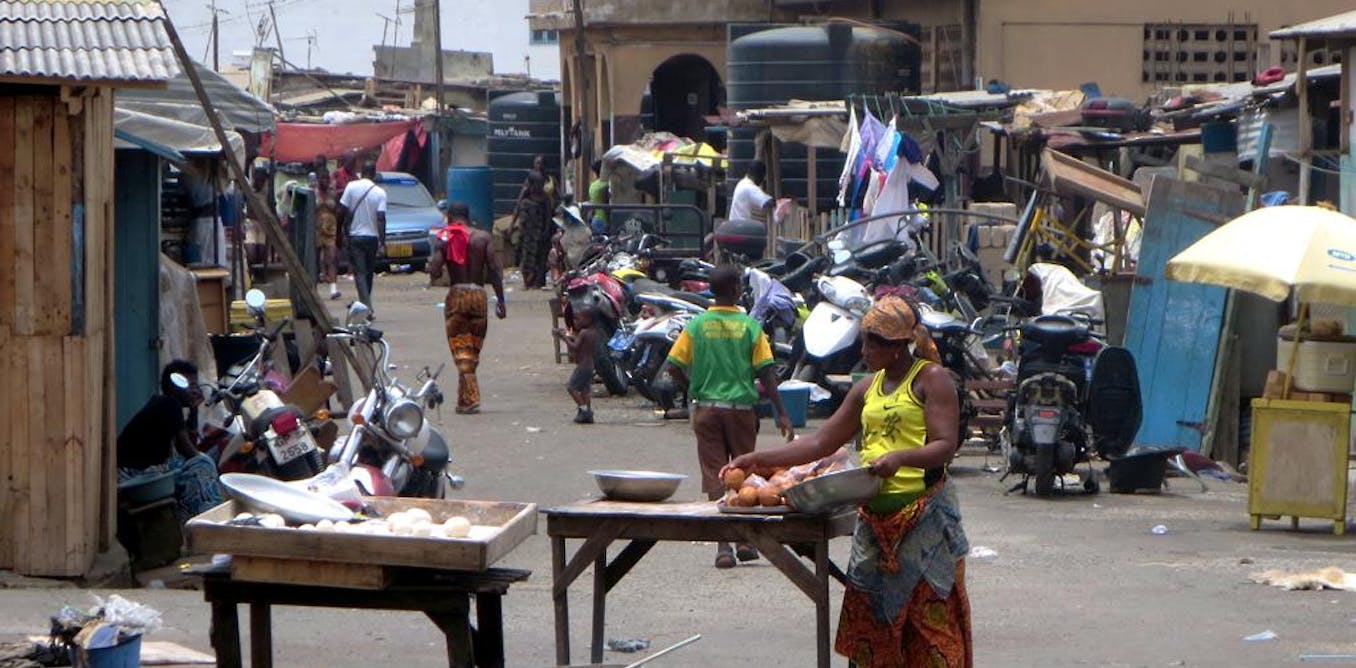Migration is a world phenomenon. In West Africa, about 33% of folks have moved from their village of beginning. In Ghana, inter-regional motion is a big contributor to the place folks are living, with over 50% of the inhabitants residing out of doors the villages they had been born in.
Earlier analysis displays that the better Accra area draws the most important collection of migrants by way of a ways. The overall development is that individuals transfer from the fewer economically endowed places within the northern areas to search out paintings within the quite richer south.
Many of those migrants finally end up in deficient neighbourhoods within the town’s city centres as a result of they can’t have enough money rents in larger residential spaces. At the margins of society, the deficient stipulations they are living in lead them to vulnerable to environmentally triggered sicknesses similar to malaria, cholera and typhoid.
To guage the fitness of migrants, analysis has historically basically excited by geography, sexual in poor health fitness, the double burden of infectious and protracted sicknesses, the surroundings, wealth, source of revenue and fitness components.
The analysis displays that rural migrants and citizens in deficient communities have the next burden of sexual in poor health fitness and be afflicted by each infectious and non-communicable sicknesses. Those also are the main reasons of loss of life and incapacity.
In our learn about we expanded the lens to know patterns of illness by way of having a look at way of life components in addition to social components. Those integrated how lengthy migrants stayed in a spot, what activity they’d, how spiritual they had been and the way regularly they ate “side road foods”.
What our analysis issues to is {that a} systematic coverage framework to advertise the energetic introduction of social networks – at formal and casual paintings puts and at puts the place folks congregate for sport or for worship – would make a dramatic distinction in serving to migrants larger handle their fitness.
Contents
The standards that have an effect on migrants’ fitness
Researchers have historically used a suite of social components that have a look at migrants’ illness patterns to decide their fitness standing. Those have integrated residing and dealing stipulations, circle of relatives wealth, fitness literacy, schooling, employment and the stage of autonomy in jobs, the standard of housing, ethnicity, and gender.
Atmosphere components additionally come into play. Those come with the standard of meals and water, air and soil. For instance, sicknesses thrive in spaces the place migrants are living in degraded, overcrowded environments with deficient sanitation. Overcrowding will increase the danger and unfold of respiration sicknesses. This turns into worse when too many of us use charcoal and firewood as cooking fuels.
As well as, social relationships had been proven to subject.
Urbanisation dramatically impacts social relationships. For instance, conventional existence of circle of relatives cooking and the sharing of domestic cooked meals are changed by way of out-of-home “side road foods”. This has ended in an building up in way of life sicknesses similar to cardiovascular sicknesses and related chance components like weight problems, hypertension, cholera and different diarrhoeal illness epidemics.
Social relationships additionally have an effect on the social improve networks migrants can depend on to get right of entry to fitness care products and services.
Our learn about seemed on the fitness standing of migrants in Jamestown, a poorer neighbourhood in Accra.
We discovered that socio-demographic components, person existence and the kind of assets migrants may just get right of entry to via their social networks all performed an element in how wholesome, or now not, they had been.
Migrants face more than one fitness demanding situations. Hazardous running and deficient residing stipulations in addition to the reality that they have got moved to new and unfamiliar terrain additionally play an element. For instance, we discovered that migrants who had lived within the neighbourhood longer had been much more likely to have a greater fitness standing than those that had migrated just lately.
The roles they did additionally affected their fitness. The ones hired in jobs involving bodily task similar to masonry, welding and carpentry had been much more likely to mention they had been wholesome when compared to those that supplied products and services, similar to seamstresses, nurses and drivers. Migrants taken with gross sales similar to buying and selling, meals merchandising and fish mongering additionally didn’t price their fitness extremely.
Migrants who purchased meals from meals distributors had been much more likely to have a decrease self-rated fitness standing than those that didn’t.
Social capital
The affiliation between deficient migrants’ existence and their fitness in deficient city neighbourhoods in addition to how social capital mediates that affiliation has been a in large part not noted house of analysis.
Earlier analysis in Accra on poverty and fitness has in large part targeted at the spatial distribution of inequalities in fitness. It has proven that there’s asymmetric distribution of sicknesses with some puts having upper incidence of sure sicknesses than others.
However we discovered that those that felt that they’d sufficient knowledge on are living effectively – together with get right of entry to fitness care from the host inhabitants in Jamestown – had a extra sure outlook on their fitness. This confirms previous analysis that social capital on the person and interpersonal degree is a big supply for passing on knowledge in addition to a predictor of fitness.
This learn about is vital as it supplies one of the most solutions about present fitness differentials for folks residing in deprived neighbourhoods and issues out one of the most contributions that existence could make. The findings have implications for coverage. They are able to additionally assist design enhancements in spaces of neighborhood medical insurance schemes, strengthening neighborhood fitness care methods, and selling communal and circle of relatives improve methods which can be falling aside.
Data and schooling are key
As issues stand, individuals who don’t get ok details about fitness problems regularly lodge to less expensive natural drugs and unauthorised typical drugs which can be much less efficient in controlling sicknesses similar to malaria, TB, cholera or even weight problems. This now not simplest endangers migrants’ fitness: it will possibly additionally give a contribution to drug resistance.
After all, fitness amenities must be progressed in order that migrants have get right of entry to to reasonably priced fitness products and services. Recently many have very little get right of entry to.
However the analysis highlights the will for intervention at a a lot more granular degree. It displays that there’s an pressing want for solid insurance policies to improve casual fitness schooling, fitness literacy and counselling to migrants in addition to host populations about wholesome residing.
New insurance policies must be advanced to advertise proactive social, familial and neighborhood improve networks that facilitate larger details about fitness. This would come with details about wholesome residing, excellent hygiene and accountable sexual behaviour.
Robust networks would assist facilitate discussions amongst neighborhood participants about techniques to steer clear of fitness dangers related to existence, deficient sanitary stipulations and unprotected intercourse. They might give you the channels by which folks may well be armed with the important knowledge to enhance their lives, specifically their fitness. This, then, would inspire them to take the important steps to steer clear of dangers.
Supply Through https://theconversation.com/how-strong-social-networks-can-help-migrants-manage-health-risks-better-67724



